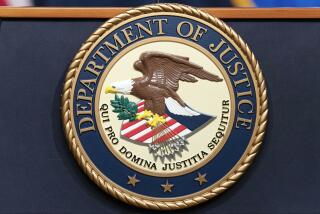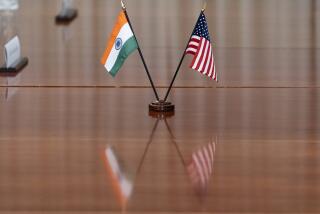Terror Figures Met in Lahore, Pakistan Says
- Share via
ISLAMABAD, Pakistan — A suspected Al Qaeda explosives expert being hunted for more than a year by the FBI met secretly in Pakistan last spring with one of the terrorist network’s planners and a computer engineer, Pakistani officials said Monday.
The bomb maker, described as an Arab, managed to slip out of Pakistan along with senior Al Qaeda member Abu Eisa al Hindi after a March meeting with computer engineer and communications coordinator Mohammed Naeem Noor Khan in the city of Lahore, said Maj. Gen. Shaukat Sultan, spokesman for Pakistan’s military.
Investigators found surveillance reports related to buildings in the U.S. and Britain on Khan’s computers and dozens of disks. But nothing Khan told interrogators suggested a new attack plan was discussed at the meeting in March, Sultan said in an interview.
“They just met. That is it,” he said.
The military spokesman said he could not identify the explosives expert or his nationality. Time magazine identified him Monday as Adnan El Shukrijumah, 29.
More than a year ago, the U.S. State Department offered a reward of up to $5 million for information leading to El Shukrijumah’s arrest.
In March 2003, the FBI described him as an asthmatic with several Arab aliases who carried a Guyanese passport, but who might try to enter the U.S. with a Saudi, Canadian or Trinidadian passport.
At the time, his father told reporters that El Shukrijumah had left home in the U.S. three years earlier and had last been heard from in Morocco, where he was working as a computer engineer.
Sultan said several elements of Time magazine’s report on the meeting in Lahore were incorrect.
Citing an interview with Pakistani President Pervez Musharraf last week, the magazine said the three men and a fourth, a Pakistani American, met in the South Waziristan tribal region on Pakistan’s rugged border with Afghanistan. It is considered a likely hiding place for Al Qaeda leader Osama bin Laden and his chief lieutenant, Ayman Zawahiri.
But Sultan insisted the meeting was in Lahore, where Khan was arrested July 13.
“They also reported that it was a big ‘summit meeting,’ which was attended by a lot of Al Qaeda people from all over the world,” Sultan said. “That is all fiction.”
Pakistani authorities don’t know where the bomb maker headed after the March meeting, the military spokesman said.
“I don’t think he is in Pakistan,” Sultan said. “He is at large. I can’t say there was a flaw in security. He might have come under some cover. We don’t know because it was a discreet meeting.”
Pakistan’s security forces have arrested 12 foreign Al Qaeda suspects and 51 other militants in the last month, Interior Minister Faisal Saleh Hayat said Monday.
For the first time, he accused Islamic political parties in Pakistan of hiding Al Qaeda suspects, including some of those arrested recently. Hayat singled out parties that belong to an alliance that forms the second-largest bloc in the National Assembly.
“These religious organizations have to explain why their high-profile activists have supported Al Qaeda terrorists,” Hayat told reporters here.
Pakistani officials say a months-long operation by thousands of troops in the northwestern tribal regions on the Afghan border led Al Qaeda members to scatter in several parts of Pakistan, including Lahore and Karachi.
Hundreds of Pakistani troops launched a search operation for militants in the South Waziristan region Monday to hunt militants, officials and witnesses said.
Backed by several helicopter gunships, army and paramilitary troops converged on fortress-like mud houses near the Afghan border west of Wana, the administrative center of South Waziristan. Villagers said Monday night that no arrests had been made.
After Khan revealed the March meeting with Hindi and the explosives expert during his interrogation, Pakistan’s intelligence agency passed the information on to British intelligence, Sultan said.
“That is how Eisa al Hindi was apprehended in Britain,” the military spokesman said. British authorities arrested 12 suspects in raids that followed Khan’s arrest, but none of those arrested in Britain have been charged with a crime.
Hindi is a Muslim convert of Indian descent who in the 1990s joined Pakistan-backed militants fighting Indian rule in the disputed Kashmir region. He wrote a book about the experience, which calls on others to join the jihad, or holy war.
Special correspondent Zulfiqar Ali in Peshawar, Pakistan, contributed to this report.
More to Read
Sign up for Essential California
The most important California stories and recommendations in your inbox every morning.
You may occasionally receive promotional content from the Los Angeles Times.













